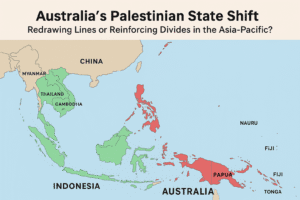Australia’s Palestinian State Shift: Redrawing Lines or Reinforcing Divides in the Asia-Pacific?
Australia’s recognition of Palestinian statehood significantly realigns its position within the Asia-Pacific. It strengthens diplomatic ties with key Southeast Asian partners like Indonesia and Malaysia, who have long supported Palestine, fostering goodwill based on shared anti-colonial principles. However, this move sharply contrasts with Pacific neighbors including Papua New Guinea and Fiji, who maintain strong alliances with the US and Israel driven by security dependencies, aid relationships, and influential evangelical Christian communities.
While the decision highlights existing regional cleavages, experts widely agree it won’t trigger a wave of new recognitions from holdouts like Japan or Singapore. Crucially, Australia’s stance is unlikely to damage vital Pacific relationships, where climate financing and strategic cooperation outweigh disagreements on distant conflicts. Ultimately, this repositioning signals Australia’s independent foreign policy but reinforces how entrenched alliances and divergent priorities continue to shape the Asia-Pacific order.

Australia’s Palestinian State Shift: Redrawing Lines or Reinforcing Divides in the Asia-Pacific?
Australia’s recent decision to formally recognize Palestinian statehood marks a seismic shift in its decades-old Middle East policy. While aligning Canberra with key Southeast Asian partners like Indonesia and Malaysia, this move starkly contrasts with the stance of Pacific neighbors like Papua New Guinea and Fiji. This divergence illuminates the complex web of interests shaping the region’s alliances and raises critical questions about its future diplomatic landscape.
Southeast Asia: A Welcoming Embrace, But Not Without Cracks
Australia’s decision was met with immediate praise from Indonesia, lauding its “courage.” This alignment isn’t new; Indonesia, Malaysia, and Brunei recognized Palestine back in 1988, followed by the Philippines in 1989. Malaysia stands out as the region’s most vocal advocate, maintaining no diplomatic ties with Israel and barring Israeli passport holders.
However, Southeast Asian unity is far from monolithic:
- Strong Advocates: Malaysia, Indonesia, Philippines (driven by anti-colonial principles and Muslim solidarity).
- Formal Supporters, Less Vocal: Vietnam, Cambodia (recognize Palestine but maintain quieter diplomacy).
- Neutral or Reserved: Thailand (formally recognizes but historically neutral), Myanmar, Laos (less engaged).
Experts like Dr. Mary Ainslie (University of Nottingham) highlight a crucial nuance: while supporting Palestine, many ASEAN nations avoid strong condemnation of Israel. This stems partly from significant, often undisclosed, economic and technological links with Israel, and partly from a desire to avoid scrutiny of their own domestic human rights situations under the principle of non-interference. “Calling out potential abuses in another state points to similar internal problems,” Dr. Ainslie notes.
The Pacific Divide: Faith, Aid, and the US Alliance
The Pacific reaction presents a stark contrast. PNG, Fiji, Nauru, Palau, Tuvalu, and Tonga do not recognize Palestinian statehood. Their alignment with the US and Israel is deeply rooted:
- Strategic Dependence: Heavy reliance on US aid and security partnerships shapes foreign policy.
- Religious Influence: Evangelical Christianity plays a significant role. As Prof. Derek McDougall (UniMelb) explains, similar to the US, evangelical communities in the Pacific (including within Indigenous populations like Fiji’s iTaukei) often provide strong political support for Israel.
- Symbolic Gestures: PNG’s controversial opening of an embassy in Jerusalem in 2023 underscored this alignment. Six Pacific nations joined the US and Israel in voting against a UN ceasefire resolution in Gaza.
Will Australia’s Move Trigger a Ripple Effect?
While welcomed by some in ASEAN, experts agree Australia’s decision is unlikely to prompt a wave of new recognitions across the region:
- Established Positions: Countries like Japan, South Korea, and Singapore maintain long-standing policies of expressing support without formal recognition; Australia’s shift doesn’t alter their core calculations.
- National Interests Prevail: Dr. Muhammad Zulfikar Rakhmat (CELOS) emphasizes that reactions within ASEAN will depend entirely on individual national interests regarding Palestine, not Australia’s stance.
- Pacific Priorities Unchanged: For Pacific nations, the Palestinian issue remains distant. Dr. Sione Tekiteki (AUT) stresses that Australia’s vital role in climate finance, regional security (especially regarding China), and development aid vastly outweighs differences on this conflict. The Pacific’s “friends to all” posture means disagreements on specific issues rarely derail core relationships.
Beyond Recognition: The Real Cost for Australia?
The immediate diplomatic fallout for Australia is likely minimal but nuanced:
- Southeast Asia: Strengthens ties with vocal supporters (Indonesia, Malaysia), potentially creating goodwill. Unlikely to damage relations with more reserved neighbors.
- The Pacific: While placing Australia at odds with many Pacific governments, the fundamental pillars of the relationship – aid, climate, security – remain intact. As Dr. Tekiteki notes, “Pacific states rarely let partners’ positions on distant conflicts determine the overall ambit of their bilateral and regional relationship.”
- The Larger Game: Australia’s credibility on climate action and its strategic posture in the US-China competition will continue to be the primary factors shaping Pacific perceptions, far more than its Middle East policy.
The Takeaway: A Symbolic Shift with Strategic Nuance
Australia’s recognition of Palestine is a profound symbolic gesture reflecting evolving domestic and international pressures. However, its impact across the diverse Asia-Pacific region is largely symbolic too. It reinforces existing Southeast Asian alignments for some but highlights a clear divide with the Pacific driven by distinct historical ties, religious currents, and strategic dependencies. Rather than redrawing the regional map, it underscores the complex, often competing, priorities that define Asia-Pacific alliances. The move signals Australia‘s willingness to step out of lockstep with traditional Western allies on this issue, but its long-term regional influence will still hinge on tangible actions addressing the Pacific’s existential climate threats and navigating the great power rivalry defining the 21st century.
You must be logged in to post a comment.